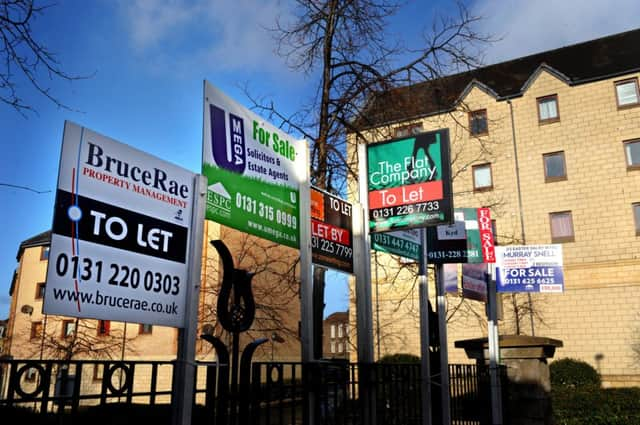Taxing time for the Scots market


The land and buildings transaction tax (LBTT) came into force on Wednesday, replacing UK stamp duty north of the Border. With the new system imposing higher charges on more expensive homes the past few weeks have seen a surge of activity at the top end of the market, but activity and prices in that sector may now drop off.
One expert believes the housing market could “enter hibernation”, with a lull over the summer months before buying and selling levels in Scotland pick up again.
Advertisement
Hide AdAdvertisement
Hide AdUnder LBTT there is no tax on transactions below £145,000 (compared to £125,000 previously). A marginal tax of 2 per cent is charged between £145,001 and £250,000 and there’s a 5 per cent levy between £250,001 and £325,000.
A 10 per cent charge applies between £325,001 and £750,000, while there’s a 12 per cent marginal rate above that level.
The new rates are progressive and so charged only on the value that falls within each band, whereas the ‘slab’ structure of stamp duty meant a single higher rate applied to the whole price once the threshold was breached.
The LBTT rates were tweaked in January to bring it more in line with revised stamp duty rates introduced south of the Border in December. The point at which buyers in Scotland pay more property tax than those elsewhere in the UK now begins at £333,000 and charges at the higher end of the market are considerably steeper than under the old system.
Someone buying a home worth £500,000 will now pay £23,350 in tax, up 60 per cent from the previous charge. Sales of properties at and above that level have increased dramatically in recent months as buyers have sought to beat the rise. The number of properties listed for sale in the capital at £500,000 or higher was up 260 per cent between October 2014 (when the LBTT was unveiled) and January 2015, compared with the same period a year earlier, said Dr John Boyle, head of research at Rettie & Co.
“There is little doubt that many of those at the top end of the market have been moving to get their properties on the market and sold to beat the increased tax take and maintain the price. The danger is that the this market goes into hibernation now for a period of time,” said Boyle.
David Marshall, business manager at MOV8 Real Estate, concurred.
“In the short-term there is likely to be a period of adjustment in the market for larger family homes. The tax paid on a £450,000 property, for example, has risen by almost £6,000,” he pointed out. “That money has to be paid up front and can’t be spread over the life of a mortgage so that will clearly have an impact on the budgets of buyers at this end of the market. “
Advertisement
Hide AdAdvertisement
Hide AdProspects of a similar bounce in sales at the lower end of the market under the new rates appear slim, however.
“It won’t make much of a difference in stimulating the market as savings are around £200 to £400 typically,” said Boyle.
“This could leave the Scottish government with a hole in its finances as the tax changes were meant to be revenue neutral (as it has stalled the top end while not stimulating the lower end sufficiently).”
But the new system will over time deliver a boost for first-time buyers and stimulate more activity in that market.
Marshall said: “The up-front costs associated with buying a home – in particular the deposit requirements to secure a mortgage – remain a significant hurdle for a large number of people trying to get onto the property ladder.
“Even within a city like Edinburgh where house prices are higher than elsewhere in the country around one in three buyers will now pay no tax on the purchase.”